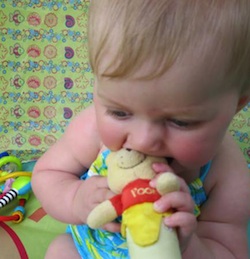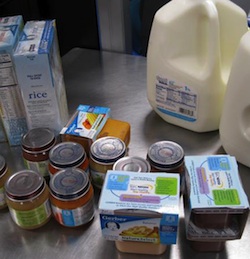Witnesses to Hunger 5 Year Anniversary
December 3, 2013
This article was first published on Drexel Now.
All too often, decisions about hunger and poverty fail to include the perspectives and opinions of low-income people who have first-hand experience with these issues.
Since 2008, the “Witnesses to Hunger” program at the Drexel University School of Public Health has sought to bring these true experts into the conversation by equipping caregivers of young children with digital cameras to document and describe their experiences with hunger and poverty. After beginning in Philadelphia, the program has expanded to multiple other sites, including Boston, Baltimore and Camden, N.J., with more than 80 participants in total. Through their photos and testimony, the Witnesses spark dialogue, engage and inform policy makers and inspire change.
To mark the program’s five-year anniversary, about 30 Witnesses from all sites will reunite at Drexel on Dec. 11. With guests and staff from the Center for Hunger-Free Communities which coordinates the Witnesses program, they will celebrate and reflect on program’s achievements to date, and on the work still to be done to address endemic hunger and poverty in American communities.
A photo exhibit will be on display from Dec. 10 through Dec. 12 at Drexel’s Bossone Research Enterprise Center.
“In this country, 17 million children live in households that don’t have enough money for a healthy, nutritious diet,” said Mariana Chilton, PhD, an associate professor and director of the Center for Hunger-Free Communities, who founded Witnesses to Hunger. “But hunger is solvable. It’s solvable when the political and public will is there to support a living wage, and when proven programs that feed children receive support.”
Meet Witnesses to Hunger: First-Hand Experience Behind the Policies and Statistics
Photos and testimony from Witnesses to Hunger show the human lives behind the statistics and public policy decisions. (For the biographical stories below, some members of Witnesses have chosen not to use their last names.)
Imani S., a member of Witnesses to Hunger in Philadelphia, is a hardworking mother of two boys. She works full-time as a janitor, but she still struggles to make ends meet. Through Witnesses, Imani has become an advocate for programs that allow herself and her sons to live healthier lives, such as the Supplemental Nutritional Assistance Program (SNAP, commonly referred to as food stamps). Imani asks others to imagine her situation: “What would you do if you were in my shoes? If you had to work two jobs to take care of your kids and it still wasn’t enough? And then the government tells you you can’t have Food Stamps to feed your kids…what would you do?”
Quanda B. is a member of Witnesses to Hunger in Boston who has two children. She has lived in the South End of Boston for six years, and for the past four years she gone back and forth between working and receiving benefits under the Temporary Assistance for Needy Families program (TANF, commonly referred to as welfare). While on TANF, Quanda has struggled to provide for her family, so she wants to improve the TANF program through changes such as getting rid of the family cap policy. Quanda recently completed her first year of community college and is now working as a parent partner at a Boston organization which aims to close the educational gap from birth to age five for low-income families. Quanda believes that Witnesses to Hunger is important because she can let people know what is really going on with families in her community.
Beatrize C., a member of Witnesses to Hunger who lives in Camden, N.J., is a working mother with one young son. Beatrize dreams of earning her surgical technologist certification. She knows the classes, loans and homework would mean more strain in her struggle to make ends meet, which includes a 40-hour-a-week convenience-store job and use of SNAP. She joined Witnesses because she felt that people need to know the positive aspects of Camden, and that people need encouragement to make a positive change in their community.
Margaret M. and her husband live in Baltimore with their five children, the youngest being 2 years old. Both Margaret and her husband work full time, but struggle with their mortgage and bankruptcy issues. Margaret is grateful for the assistance provided by WIC and free school breakfasts, and she is currently in school so she can move into a more rewarding and higher paying career. As someone who has experienced deep poverty when she was younger, she wants to share with the world both the difficulties her family faces and her successes.
.ashx?la=en) |
He's hungry: He was asking the case worker for something to eat. I don’t have child care, so I have to take him to my appointments. If he was in day care I wouldn’t have to have lugged him early in the morning to an appointment to the welfare office to try to get food stamps and medical coverage. I can’t help it if my baby’s hungry. I was thinking ‘I’m not going to lie to you miss, he’s hungry.' - Imani S., Philadelphia
|
 |
I've Been There: I don’t like an empty freezer. I don’t like an empty freezer because I’ve been where my freezer was completely empty. It’s like my pockets are already empty. Why does my fridge have to be empty too? So I’ve just cut out certain things, like no company for dinner. And I nibble. Me and my daughter, we’ll eat that for Monday, Tuesday, Wednesday. That rice will last us for a week and it won’t be the same rice. It’ll be white rice today. I’ll put some stuff on it and it’ll be yellow rice. I’ll put some canned peas in it to stretch it out. - Quanda B.
|
.ashx?la=en) |
Welcome to Camden: That’s right next to a new apartment building. Why is it that they could build that apartment to be so beautiful but they can’t fix a house this small next to it? That house is probably like, what, two bedrooms? It says Department of Public Works on the door. Welcome to Camden. - Beatrize C. |
 |
Camden's Future: Just because he is in Camden does not mean a child won’t come out being happy. Just because this is not the American dream or the American-looking family, that does not mean a child won’t come up all right. I want that image to change, because there’s some good stuff in Camden. It’s not all bad stuff. Kids do grow up happy in Camden. I did. I came out fine. - Beatrize C. |
 |
Nutrition Makes a Difference: I ate really healthy when I was pregnant with her, with the help of WIC. I think there was a difference in her health because of the nutrition that I had gotten with her. I had poor health with my older children because of the unhealthy food I at during my pregnancy, and it made a difference. WIC made a difference. Receiving WIC for the first year of her life helped her to be a healthy baby who has a good immune system and great developmental skills. - Margaret M. |
 |
Using WIC: The cashier made me feel so bad about myself for using WIC. As soon as I got in her line she saw my WIC folder, she puckered her lips because she doesn’t like messing with the WIC. She made me feel like I was doing something wrong. Like ‘you shouldn’t be getting this assistance, you should be paying for this.’ I just felt really uncomfortable. And then people are getting in line and the line’s getting longer, so you’re feeling like you’re holding up the line. I started getting embarrassed about it. I didn’t like that feeling. - Margaret M. |
Looking Forward After the First Five Years
The program is poised to grow into an education and advocacy project spanning from coast to coast, with a new Witnesses to Hunger site to be announced during the anniversary reception.
“Hunger and poverty in American communities are not going away until the tide of public awareness and public will turns toward making them end,” Chilton said. “The women and men of Witnesses to Hunger are the truth behind the myths and misperceptions about poverty, and their work is not done. Look at their photos. Listen to their experiences. Share what you learn with your friends and family, your neighbors and your legislators, to transform our country into a place where all our children can thrive.”
Event Details
The Witnesses to Hunger anniversary reception is free and open to the public and will take place on Dec. 11, 2013 from 6-9 p.m., with the formal program at 7 p.m. featuring remarks by several Witnesses, Chilton and Estelle Richman, chief operating officer of the U.S. Department of Housing and Urban Development and former secretary of public welfare of the City of Philadelphia. Advance registration is encouraged: http://www.eventbrite.com/e/witnesses-to-hunger-5-year-anniversary-exhibit-reception-tickets-8993972213.
The Witnesses to Hunger photo exhibit will be on display and open to the public on Dec. 10 (9 a.m. to 8 p.m.), Dec. 11 (9 a.m. to 10 p.m.) and on Dec. 12 (9 a.m. to 1 p.m.). The anniversary photo exhibit features original photos taken at each Witnesses to Hunger site over the past five years, a wall of new and updated photos shared for the anniversary event and an “action wall” highlighting the Witnesses’ impact through public speaking, meeting with legislators and amplifying their voices through the media.
The photo exhibit and anniversary reception will both be located at Drexel University’s Bossone Research Enterprise Center, 3140 Market Street.
News Media Contact
Rachel Ewing
News Officer, University Communications
raewing@drexel.edu
Phone: 215-895-2614
Mobile: 215-298-4600